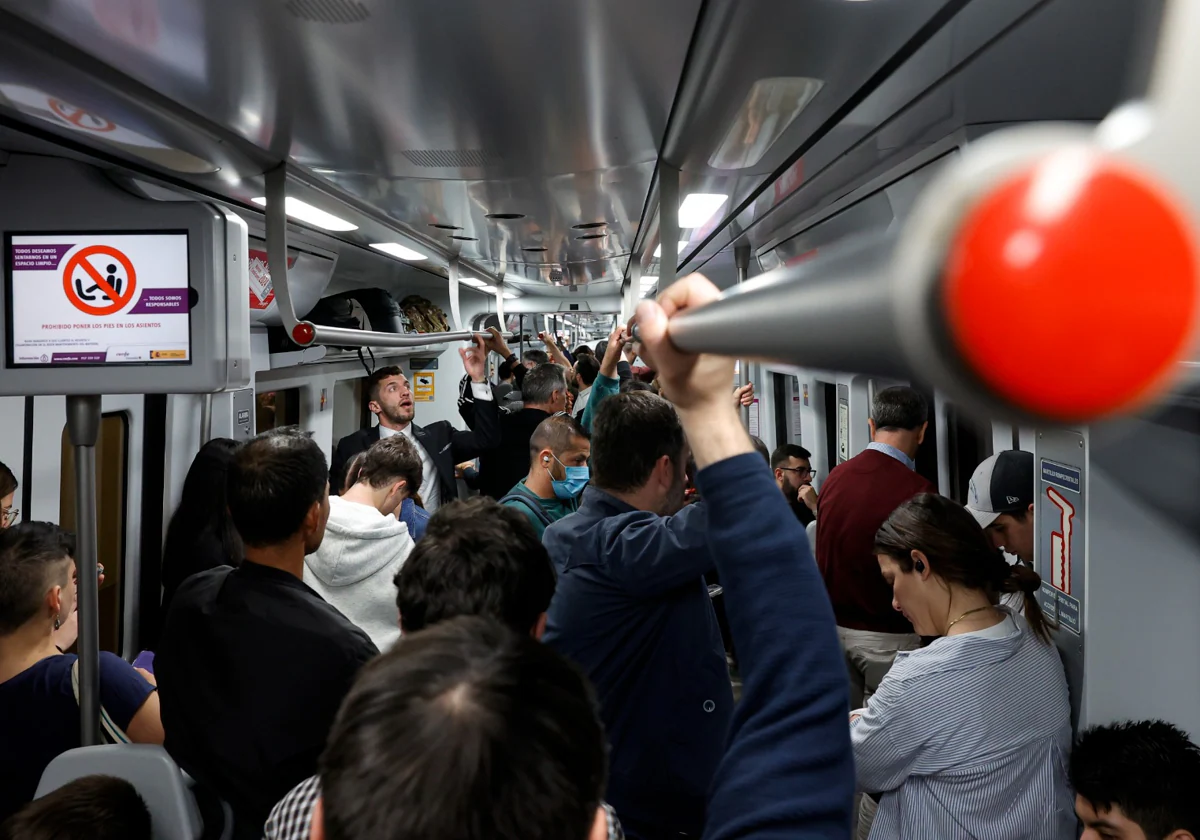Complaints soar on the Costa del Sol's local rail service
Claims filed by users total almost 2,700 a year and grew 150% up to 2022, although Renfe defends 99% punctuality
Francisco Moya, who was nicknamed the "scourge of Renfe" by this newspaper for his tireless campaign to demand a better service on the Cercanías de la Costa train line, asked the public company last year for the number of complaints it had received from users. He did this in light of an evident deterioration, with continuous criticism of delays and cancellations.
The process began in August 2023 and ended eight months later, this May. After Renfe's initial refusal, the activist appealed to the committee for transparency and good governance, which finally agreed with him. That is why the latest data provided was for 2022.
The figures, at least up to that date, leave no doubt about the growing unease of local train users in Malaga. That year, 2,677 complaints were registered, which meant about 50 every week, with a growth of 147 per cent compared to 2019 (the year before the pandemic, which saw a record number of passengers). It also grew by 37 per cent compared to 2021. That year there were 1,952 complaints, up 80 per cent on 2019.
"The increase in complaints is striking," explains Moya. "Although it is true that the volume of passengers has increased a lot, if the service was good, there should not be an exponential increase in complaints... You can see that the train is at the limit of its capacity," he says.
"Renfe makes a relative ratio of complaints per passenger, which is the one that appears in their reports at national level, but this is the first time that they have given the data for Malaga in isolation. They have been forced to do so because in the first instance they refused to give [the data], alleging damage to their image and in the face of competition from other means of transport," he adds.
Instead, the transparency committee has stated that this is a public service and is obliged to account for quality. This has encouraged the "scourge of Renfe" to ask for the 2023 figures through the transparency portal, given that he already has a previous resolution in his favour.
Why so much criticism?
The situation on the Malaga railway network in 2022 must be taken into account. At the beginning of the year, until April, the reduction of trains persisted due to the shortage of train drivers, which had begun in October 2021. Meanwhile, towards the end of the year, September saw the beginning of free tickets, and after this measure, the number of passengers shot up and, consequently, the overcrowding of the carriages.
"In 2022 they operated all the trains but there were many incidents due to technical faults; the number of complaints surprises me because it was not free all year. On the one hand, there was a shortage of service, and on the other hand, there was overcrowding at the end of the year. It is very striking compared to 2019, when there were already many passengers," Moya explains.
It is also true that, although the complaints are addressed to Renfe, because it is the visible face of the railway network, some of them may be based on causes beyond the operator's control, such as incidents caused by track conditions (which depend on Adif) and infrastructure limitations, for example.
Despite the increase in complaints, the punctuality ratio for this service last year was above 98 per cent, according to Renfe data. Meanwhile, the public operator justifies the rise in complaints by the sharp increase in the number of passengers due to the free travel cards. It is worth remembering that last year more than 16 million people travelled on the Malaga Cercanías lines, which meant an increase of 43 per cent (almost 4.8 million more) compared to 2022.
The company argues that the incidents have been marked in recent years by the consequences of Covid (2020), which caused the problem of the lack of train drivers and the "rescheduling" of frequencies from November 2021 to April 2022. Subsequently, in September of that year, free travel cards were introduced and demand soared, which led to the first complaints about overcrowded carriages. "Complaints are in proportion to the increase in the number of users."
Commitment to improvement
One way or another, the truth is that the flood of complaints, both formal and through the media, has reached the government. In the four months of 2024, incidents, both on the trains and on the tracks, have been significantly reduced.
This coincides with the promise to carry out improvements made by the Minister of Transport, Óscar Puente, at the end of January, after being questioned by Socialist MP Ignacio López in the transport and sustainable mobility commission of the Congreso.
"Our commitment is clear, we are going to extend frequencies. We have set a target for the C1 (Malaga-Fuengirola) from 20 to 15 minutes, and if we can, to less," the minister said, adding that Adif is working to achieve the doubling of more sections, "to move from a service that has a single track on much of its route to a double track".
In this respect, it should be remembered that of the 30 kilometres of track running from the city to Fuengirola, only 19.9 have a dual track, which is a bottleneck that hinders operations. It is also true that the proximity of houses to the route makes it very difficult to undertake this work at many points along the coast.
In the newspaper archive we have to go back to 2017 to find the last commitment of this type, by the former minister of public works of the PP, Íñigo de la Serna. The current railway infrastructure dates back to 2011, when Adif completed a number of works on the double track and improved the frequency to the current 20 minutes.

